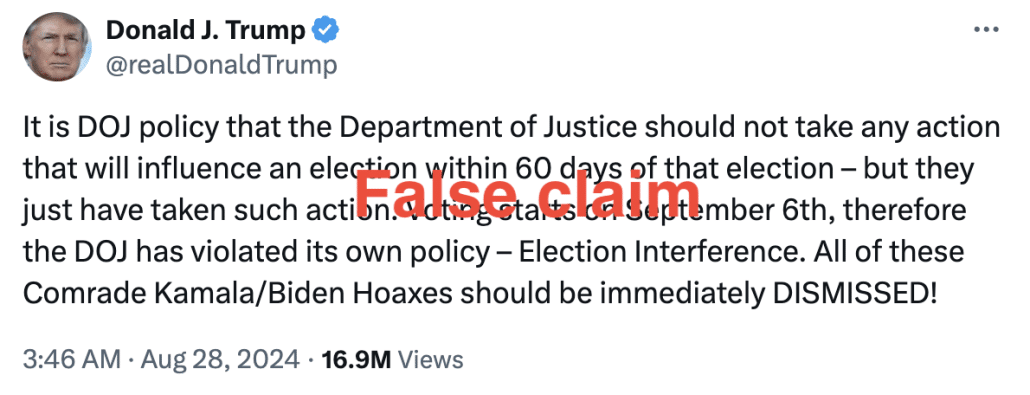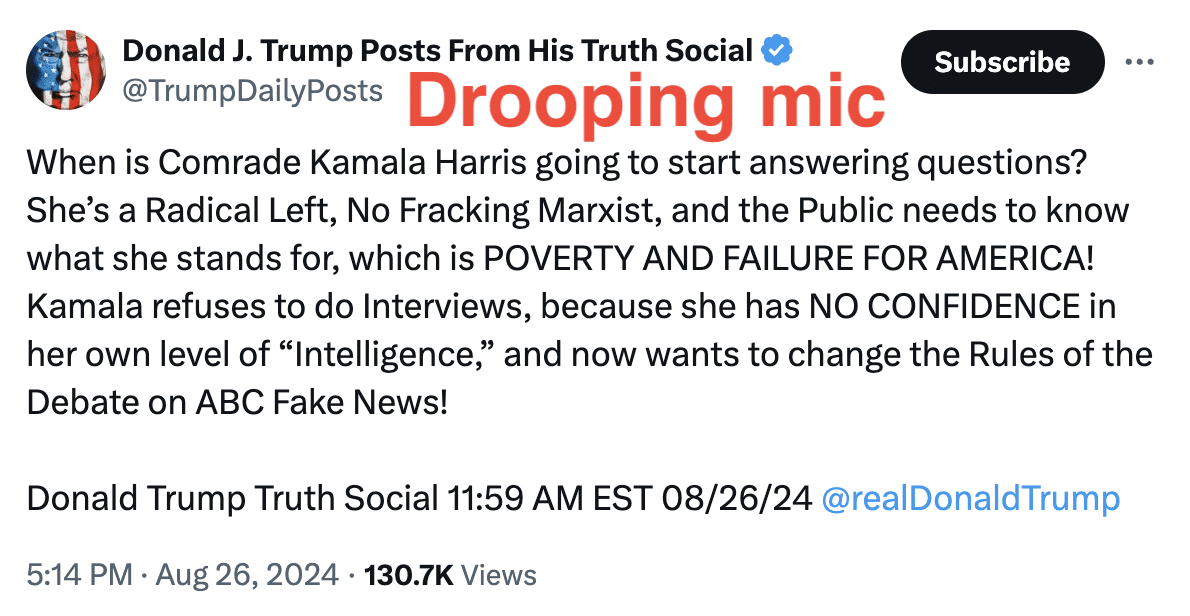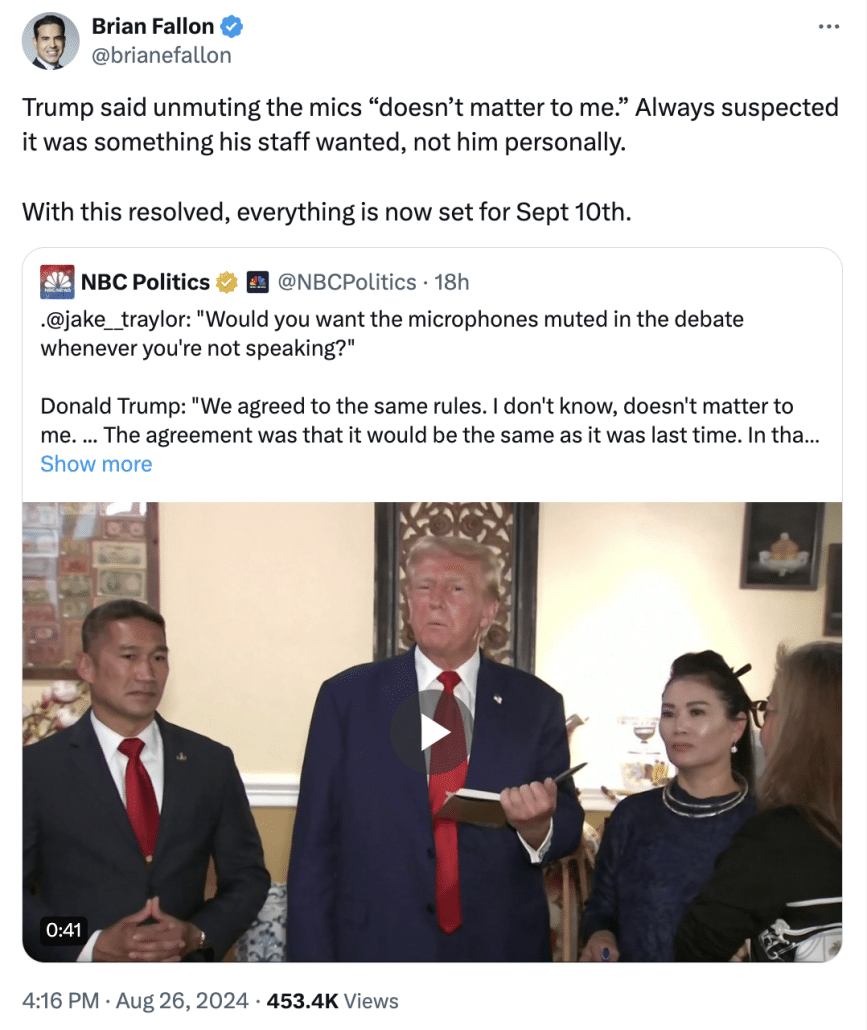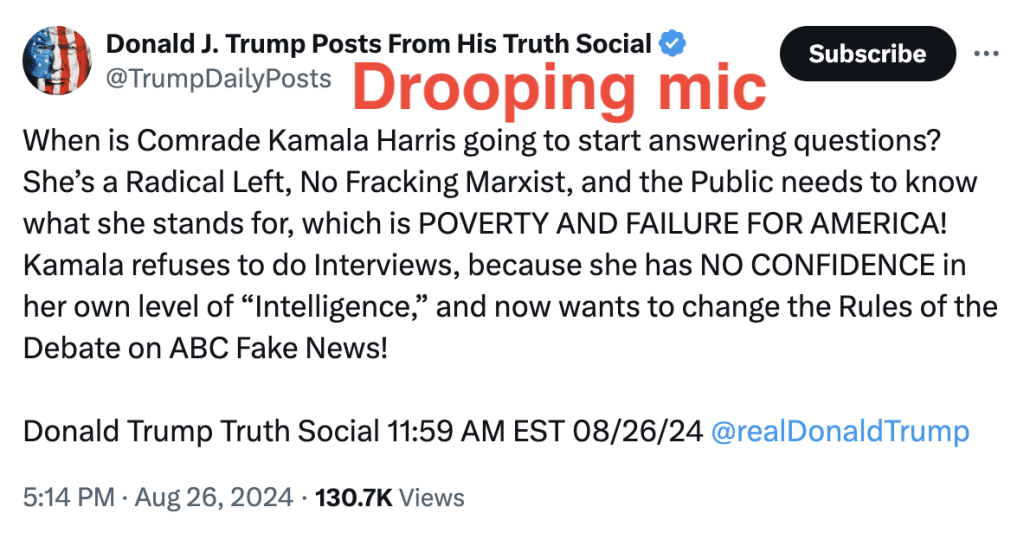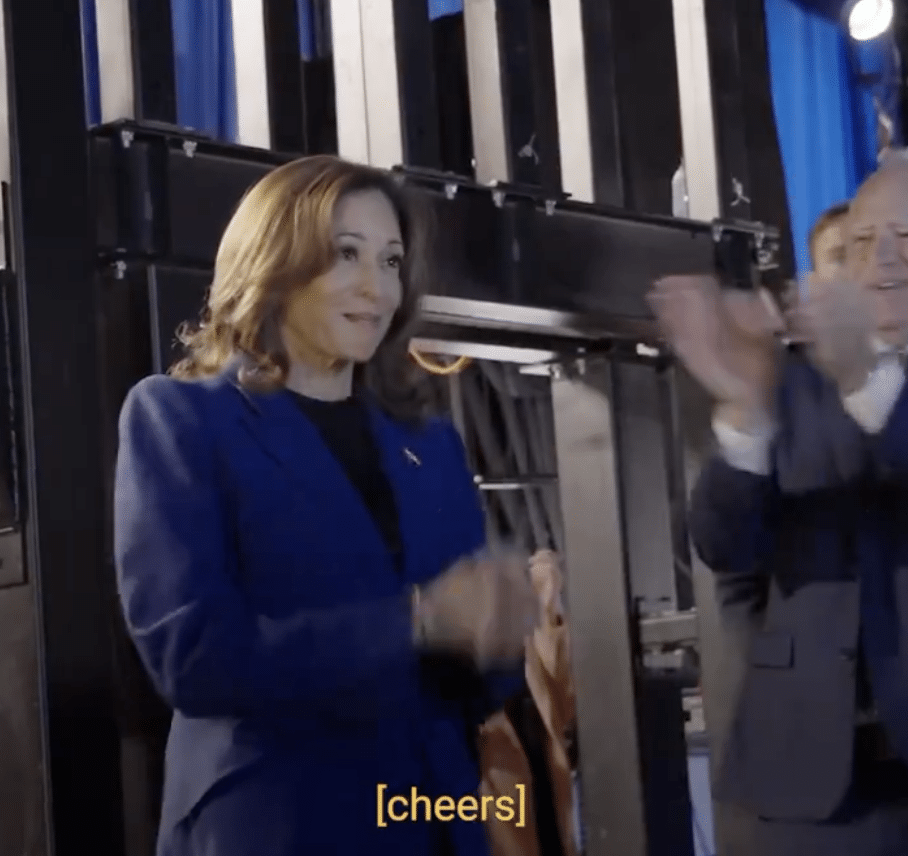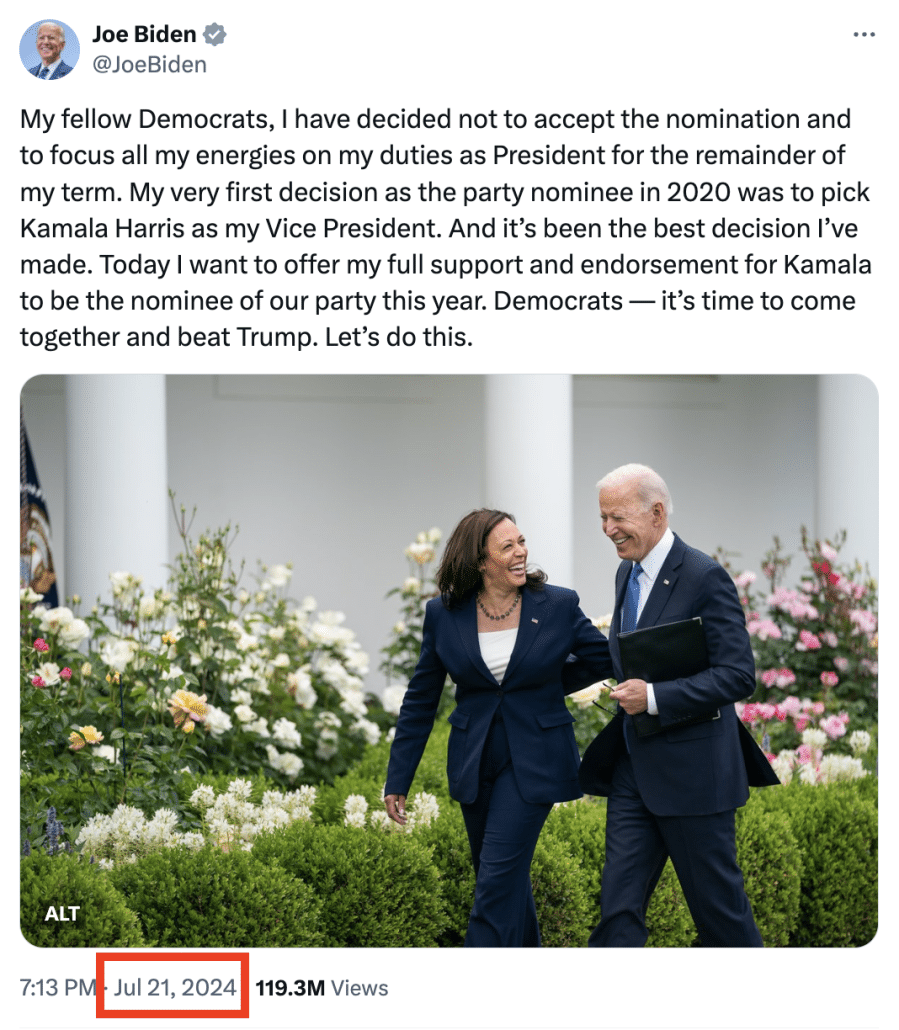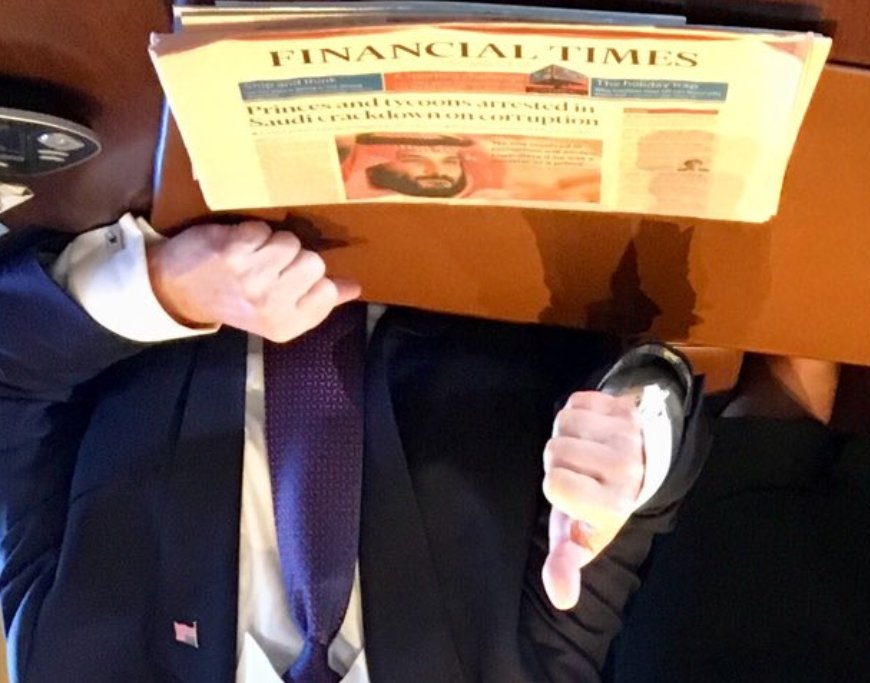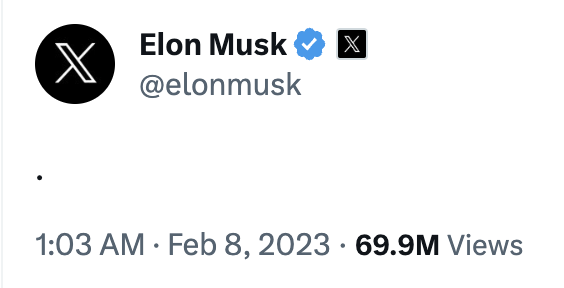Thinking of Trump in terms of presidential administrations — reading this race as a fight over incumbency — is a category error that serves to hide the threat Trump poses to democracy.
Yet a slew of reviews of the DNC have adopted that rubric in an effort to declare that Kamala Harris has positioned herself as a change candidate treating Donald Trump as an incumbent.
I first saw this argument from NYT’s Shane Goldmacher. Then, in response to a Tim Murtaugh tweet complaining about Harris, Josh Marshall wrote this column, in which he opined, “there’s little doubt that [Kamala making Trump the incumbent] is an accurate description of the campaign we are in the midst of.” Then Byron York wrote this nonsense plea for Trump to define Kamala (over a month after she joined the race) in which he claimed that her campaign argued, “the bad things that have happened in the last few years are the work of Donald Trump and not the Democratic president and vice president.”

Goldmacher adopted the rubric of Kamala as a change candidate from two sources (if not from the six paragraphs where Trump’s team complained about it). First, a misrepresentation of the directionality of the chants adopted from rally-goers and the secondary of two slogans chosen by the campaign, preferring “Forward” over “Freedom.”
With chants of “we’re not going back” ringing through a convention hall and her campaign’s “A New Way Forward” slogan plastered outside, the vice president is making a bold bid to position the same Democratic Party that now holds the White House as bringing a fresh start to the country.
[snip]
Forward has been the watchword for Democrats in Chicago, as the party embraces its most future-leaning posture since Mr. Obama’s first campaign in 2008. Delegates and supporters have circulated a new poster designed by the artist Shepard Fairey, who made Mr. Obama’s famous “Hope” poster in 2008. The refreshed Harris one features the word “Forward” at the bottom.
Even if you prefer “Forward” to “Freedom” (and ignore how much more central the latter has been to Kamala’s imagery), it still doesn’t invoke presidential administrations. Rather, it contrasts reactionary policy to moderate progressivism. Political movement does not require incumbency.
From there, Goldmacher invests his misinterpretation with great significance using the same tools that most mediocre campaign punditry masquerading as journalism does: polling.
The battle over the mantle of change is especially significant at a moment when polls show a sizable majority of Americans are unhappy with the state of the nation’s affairs.
Former President Donald J. Trump had established a clear edge as the candidate who would upend the status quo when he was still facing President Biden. He was the insurgent; Mr. Biden was the incumbent. But now Ms. Harris, a 59-year-old who would make history as the first female president, has altered the dynamics of a contest that had previously pitted two men seeking to break the record of the oldest president.
[snip]
In a New York Times/Siena College poll this spring of battleground states, an overwhelming 69 percent of voters said that major changes were needed to the country’s political and economic system — or that the system needed to be torn down entirely.
The problem for Democrats was that only 24 percent of voters thought Mr. Biden would do either of those things.
But recent polls of swing states in the Sun Belt show that voters do not view Ms. Harris the same way they do Mr. Biden. While far more voters still see Mr. Trump as more likely than Ms. Harris to make major changes — 80 percent to 46 percent — they are more divided on whether he would bring the kind of change that they want.
Exactly the same share of voters — 50 percent each — said Ms. Harris would bring about the right kind of changes compared with Mr. Trump. [my emphasis]
That is, Goldmacher is interested in this for horserace reasons. The electorate is disaffected, ergo whoever can adopt the mantle of change can win the election.
Like I said: building entire stories around polling makes for facile punditry.
The claim that Kamala is running as a change candidate fails once you look at policy. Goldmacher claims that, “she is trying to differentiate herself, both stylistically and with some new economic plans.” The story he links, claiming it describes an effort to “differentiate herself” from Joe Biden in fact quotes Kamala in ¶3 describing the economic vision she presented as one belonging to a third person plural, we. “One — ours — focused on the future and the other focused on the past.” Kamala did that in a speech where she repeatedly talked about the success of the Biden Administration, we.
And, today, by virtually every measure, our economy is the strongest in the world. (Applause.)
We have created 16 million new jobs. We have made historic investments in infrastructure, in chips manufacturing, in clean energy. And new numbers this week alone show that inflation is down under 3 percent. (Applause.)
And as president of the United States, it will be my intention to build on the foundation of this progress.
This situates the movement that Goldmacher has spun, with no evidence, in terms of administrations, as a joint movement, Joe Biden and Kamala Harris, together pursuing policies focused on the future. Moreover, the story Goldmacher links admits that,
Much of Ms. Harris’s agenda represents an expansion of policies proposed by Mr. Biden in his latest presidential budget and during his re-election campaign.
This gets to one of the core things I think is leading people to get distracted about who is the incumbent. Journalists, especially those at NYT, largely ignored Joe Biden’s policy successes. They were too busy writing the twelfth Joe Biden Old story of the day to bother themselves with policy. And so simply because Kamala is new and younger and better able to pitch the very same policy — or natural extensions of that policy — all of a sudden journalists are labeling it as new, as Kamala’s effort to distance herself from Biden. Kamala is and will increasingly (especially assuming the Fed will cut interest rates next month) benefit from Biden’s successes, and the journalists who were too lazy to talk policy the first time will label it change. But that’s something that arises from journalistic laziness, not any effort by Harris to distance herself from Biden.
This is apparent even in right wing attempts to insist on continuity. When Byron York claims that Kamala is trying to distance herself, he cites a campaign video listing her accomplishments as VP.
Then came the section on Harris’s vice presidency. It claimed that she 1) capped insulin costs for older people, 2) helped replace lead pipes and provide clean water to communities, 3) helped create 16 million jobs, 4) fought gun violence, 5) “traveled the world to strengthen our national security,” 6) helped unite NATO in defense of Ukraine, and 7) “led the fight for reproductive freedom.”
Four of those things — insulin costs, gun violence, supporting NATO, and fighting for reproductive freedom — have been central in Kamala’s future policy promises; three figured prominently in her DNC speech. To a significant extent, Kamala claims she wants to continue the unfinished business of the Biden Administration.
Byron’s real complaint (as well as that of Murtaugh) is that Kamala is not capitulating to Trump’s primary digs against both Biden and her — inflation and immigration.
The two biggest items left off the list just happen to be the two biggest concerns of voters in 2024. One is Harris’s role in the disastrous Biden economic policy that helped feed inflation and made it far more difficult for millions of people to buy the basics of life, such as groceries. The other is Harris’s role in the even more disastrous Biden policy on the U.S-Mexico border, in which the administration allowed more than 7 million unvetted migrants to stay in the U.S. after crossing the border illegally.
As we saw in the North Carolina speech, when directly addressing actual inflation, Kamala would and did point to the ways that Biden has tamed it (which is what will lead to that interest rate cut next month). But on top of that, she’s promising ways to bring cost of living down, such as a child tax credit that failed under Biden but would become possible if (and only if) Democrats somehow keep their Senate majority after Ruben Gallego replaces Kyrsten Sinema.
Nor is there a discontinuity on immigration. Kamala is addressing immigration precisely the same way Biden did: by talking about how Trump tanked a bipartisan deal to fix it.
And let me be clear — and let me be clear, after decades in law enforcement, I know the importance of safety and security, especially at our border. Last year, Joe and I brought together Democrats and conservative Republicans to write the strongest border bill in decades. The border patrol endorsed it. But Donald Trump believes a border deal would hurt his campaign, so he ordered his allies in Congress to kill the deal.
Well, I refuse to play politics with our security, and here is my pledge to you. As president, I will bring back the bipartisan border security bill that he killed, and I will sign it into law.
You may not like that dodge. This effort to flip Trump’s favorite campaign issue back onto him may have limited success. But that’s not change. It’s more continuity.
And it goes to a point that Marshall makes as he puzzles through why there may be a sense that Trump is the incumbent. Trump is still acting like he’s president.
[T]here’s another paradoxical way that Trump himself laid the groundwork for this campaign, and made it possible for Harris to turn his own political heft against him. The centerpiece of Trump’s post-presidency is the wicked conceit that he never stopped being president at all.
[snip]
He still calls himself president. He demands and universally receives that billing from his followers.
He demands to be treated as president. More importantly, his demand for and policing of absolute loyalty is precisely how he was able to order the GOP to tank the immigration bill.
Immigration is not the only legislation that Trump tanked — a renewed effort to pass the child tax credit is another.
But the most lasting testament to Trump’s power as president, not mentioned by any of these men, may be the most important electorally: The decisions his hand-picked judges dictated to the American people. That starts with Dobbs, a policy on which both Trump and Harris believe he should get credit. Trump wasn’t president in 2022, but his judges were still dictating policy to half the country.
And it’s not just SCOTUS. By November I hope Kamala’s campaign points to all the other policies — student loan relief, a ban on non-competes, environmental regulations, and others — that Trump’s judges have vetoed to deprive Joe Biden of policy wins. Trump remade the way judges judge, blasting Stare decisis, and allowing a small number of judges in Texas and the Fifth Circuit to dictate policy for the entire country.
Which is one of the reasons I care about this: because so much of Trump’s lasting influence is about his lasting attack on rule of law. The insistence that this is about incumbency obscures the real threat Trump poses to democracy, whether or not he’s president.
Take this crazy Goldmacher paragraph.
For nearly a decade, Mr. Trump’s bulldozing approach has been premised on the idea that the nation was staring into an abyss and only urgent upheaval could save the country. The question for Ms. Harris is whether she can frame Democrats keeping power in 2024 as a break from that dark and divisive era.
It is true that Trump has been claiming that “only urgent upheaval could save the country.” But that was a fascist trope. It wasn’t true and even if it were, none of the policies Trump pushed would do anything but enrich people like him. Journalism should do more than observe that he made those false claims; it should explain why they’re false.
In the very next sentence, though, Goldmacher asserts that the challenge for Kamala (again adopting the dumb poll-driven assumption that she’ll only win if she is the change candidate) is by offering, “a break from that dark and divisive era.” What “era”? By reference, Goldmacher must mean that the near-decade in which Trump has told fascist lies is the “dark and divisive era” (though Trump’s racist birtherism started long before that). But it’s not an era. It’s a fascist belief, a means of exercising power, a means of dehumanizing your political opponents, one that had huge influence, but one that with the exception of the political violence it fostered, only held sway over a minority of the country (albeit a large one).
Look at how Goldmacher obscures this dynamic in the polls he cites. Of the 80% who responded that Trump would “make major changes,” 32% actually answered that he would, “tear down the system completely.” That’s fairly consistent with the 36% of people polled who believe that the changes Trump would make would be, “Very bad for the country.” (Those numbers are, respectively, 23% and 30% for Harris.) This is not a question about change. At worst, it’s a question about polarization, those who buy Trump’s fear-mongering against those who value democracy. For the 30-plus percent who believe Trump would destroy the country, it may well be a question about fascism. And in a piece where Goldmacher calls a man who launched an “insurrection” an “insurgent,” ignoring Trump’s assault on democracy while discussing those numbers is malpractice.
Trump’s assault on democracy also pervades the issues that Marshall points to in his attempt to understand this dynamic.
Marshall’s best example of Trump pretending that he remains President — that he continues to meet with heads of state — obscures the likelihood that when Viktor Orbán and Bibi Netanyahu meet with Trump, it served a multi-national effort to replace American democracy with authoritarianism. Trump is not meeting with Orbán to discuss possible policy towards the EU, he’s meeting with him as a key ally in a Christian nationalist project, one intimately tied to Putin, one committed to ending the Western liberal order.
Marshall situates Trump’s bid for revenge — which he claims is Trump’s entire platform — as a continued obsession about his ouster.
Trump’s entire platform is retribution — retribution for his 2020 defeat, which he lacks the character to recognize, and retribution for what he considers his mistreatment during his term as president.
[snip]
[A]t the most basic level it’s about the past, relitigating, being made about, wanting to fix things that happened in 2017, 2018, etc.
But even there, I think it’s a misstatement. Trump does pitch this as “revenge.” But the word is designed to obscure the degree to which even before his 2016 election, Trump led his mob to expect that he would use government to criminalize any opposition. Lock her up was the goal, not just beating Hillary at the polls. The word revenge is Trump’s way of legitimizing that assault on rule of law: it covers up how he criminalized not just Hillary Clinton and Hunter Biden but also those who deigned to investigate him. It also undermines — is intended to undermine — the legitimacy of all his criminal prosecutions, sowing doubt that he really is just a fraud conning his followers. Using the word “revenge” is in fact a false claim that he didn’t start this, when even his first impeachment was an effort to do just that.
Of course, revenge is not Trump’s entire platform. There are other key ingredients, like tax cuts for people like him. But the other foundational policy in his platform is a draconian approach to immigration, one of two reasons why Murtaugh is so desperate to claim that Harris is dodging her role in the Biden Administration.
If Trump were to win, a fascist definition of citizenship (including an assault on birthright citizenship) would serve as the excuse to “deport” (or at least to round up and detain) broader swaths of the population. More importantly, the constant efforts to inflame voters about immigration — particularly crimes attributed to “illegals” — lays the groundwork, is intended to lay the groundwork, not just the kind of fearmongering politics that failed in the past, but for the kind of Internet-mobilized right wing thuggery first tested in Ireland (including, but not limited to, the Dublin riot) and then further perfected after the UK’s Southport stabbing, with the unabashed involvement of one of JD Vance’s biggest backers, Elon Musk.
This effort from Trump’s team to falsely claim that Kamala is trying to distance herself from the Biden Administration is only partly about policy. It is, just as importantly, about laying the groundwork to stoke political violence when electoral politics fails.
Look, I get it. There are reasons why it’s easy to interpret this moment as a fight over incumbency.
- The nearly unprecedented situation, which original pitted two former presidents against each other
- Kamala’s continuation of the successful Joe Biden policies the political press ignored because they were too busy writing their 137th Joe Biden old story
- The ongoing damage Trump has done since he left the presidency, without the incumbency of the office, both with court decisions like Dobbs and with successful efforts to undermine political compromise
- Kamala’s repackaged response to Trump’s fascist threat as a way forward
The last one is the one people aren’t seeing. But it’s right there in her speech, as it was in the speeches of all of the Republicans who endorsed Kamala at the convention. Kamala’s Freedom agenda — even her Forward agenda — is in significant part an attempt to protect democracy and rule of law.
And with this election, and — and with this election, our nation — our nation, with this election, has a precious, fleeting opportunity to move past the bitterness, cynicism and divisive battles of the past, a chance to chart a new way forward. Not as members of any one party or faction, but as Americans.
[snip]
In many ways, Donald Trump is an unserious man. But the consequences — but the consequences of putting Donald Trump back in the White House are extremely serious.
Consider — consider not only the chaos and calamity when he was in office, but also the gravity of what has happened since he lost the last election. Donald Trump tried to throw away your votes. When he failed, he sent an armed mob to the U.S. Capitol, where they assaulted law enforcement officers. When politicians in his own party begged him to call off the mob and send help, he did the opposite — he fanned the flames. And now, for an entirely different set of crimes, he was found guilty of fraud by a jury of everyday Americans, and separately — and separately found liable for committing sexual abuse. And consider, consider what he intends to do if we give him power again. Consider his explicit intent to set free violent extremists who assaulted those law enforcement officers at the Capitol.
His explicit intent to jail journalists, political opponents and anyone he sees as the enemy. His explicit intent to deploy our active duty military against our own citizens. Consider, consider the power he will have, especially after the U.S. Supreme Court just ruled that he would be immune from criminal prosecution.
Kamala is running on democracy just as much as Biden did in 2020. It just looks different, because she has more successfully wrapped it in a bipartisan flag. Even there, there’s real continuity (don’t forget that one of Biden’s most important speeches about democracy in 2022, one that had a real impact on the election, was at Independence Hall).
Largely enabled by Trump’s ongoing effect — again, especially on Choice — Kamala has just found a way to make democracy matter more personally, more viscerally.
Kamala is not eschewing the incumbency she has Vice President. On the contrary, she is running on a continuation and expansion of Joe Biden’s successful policies (even if journalists are missing that). And she is running, just as Biden did, on defeating both Trump’s electoral bid but also the threat he poses to democracy itself.
Update: Swapped the featured image to show that Murtaugh continues to bullshit about Kamala distancing herself from the White House.

Update: Corrected Southport/Southgate.





